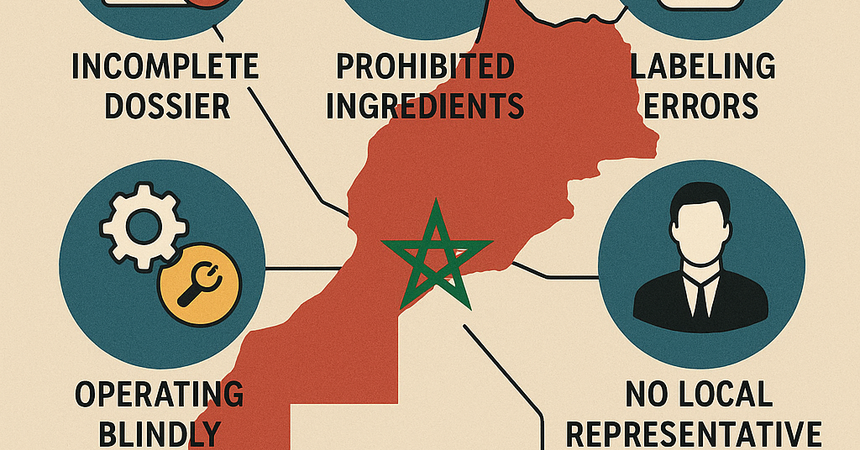Top 7 Mistakes When Registering Dietary Supplements in Morocco — And How to Avoid Them
Morocco remains one of the most promising markets in North Africa for manufacturers of dietary supplements. However, entering this market involves a number of bureaucratic and technical requirements. Companies unfamiliar with local specifics often make the same mistakes — losing time, money, and distributor trust.
Let’s break down the 7 most common mistakes and how to avoid them.
1. Submitting an Incomplete Dossier
Mistake: Manufacturers think a standard Certificate of Analysis and a label are enough.Reality: Moroccan regulators require a full dossier, including:
- Ingredient specifications
- Certificates of origin
- Manufacturing protocols
- Safety documentation
- French translations of all materials
How to avoid it:
- Prepare documents per ONSSA and DMP requirements
- Use local consultants or regulatory representatives
2. Using Prohibited or Controversial Ingredients
Mistake: Including substances allowed in the EU/USA but banned in Morocco, such as:- Melatonin
- DHEA
- Synephrine
- CBD or hemp extracts
- Non-certified gelatin
How to avoid it:
- Cross-check all components with Moroccan and Islamic standards
- Obtain Halal certification for animal-derived ingredients
- Use plant-based alternatives where possible
3. Labeling Errors
Mistake:- Poor translation
- Missing required statements
- Medical claims like “heals” or “treats”
- English-only packaging
- No importer address
- Label in both French and Arabic
- Remove medical claims
- Add full contact info and dosage instructions
4. No Local Representative
Mistake: Trying to register without a Moroccan legal entityResult: Application rejection or customs delays
How to avoid it:
- Contract a local agent or distributor
- Use a professional regulatory representative like WorldWideBridge
5. No Halal Certification
Mistake: Submitting products with gelatin or collagen without Halal documentationResult: Registration rejection or retail refusal
How to avoid it:
- Review ingredients for animal content
- Get Halal certification from accredited bodies
- Use recognized Moroccan or international certifiers
6. Underestimating Timelines
Mistake: Expecting registration to take 2–3 weeksReality: Even a complete dossier can take up to 4 months
How to avoid it:
- Plan ahead
- Submit documents early
- Be ready to respond to regulator inquiries
7. Operating Blindly Without Local Support
Mistake: Trying to save costs by handling registration soloResult: Delays, legal mistakes, and broken partnerships
How to avoid it:
- Partner with experienced regional agencies
- Work with verified consultants
How to Avoid All These Mistakes?
Contact WorldWideBridgeOur team will:
- Review your product composition and documents
- Prepare the full dossier and translations
- Handle Halal certification if needed
- Find and manage your local representative
- Complete the entire registration process smoothly and on time
Work with WorldWideBridge and secure your path to the North African market.
